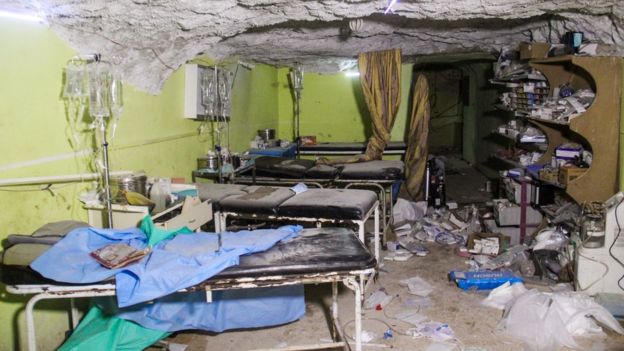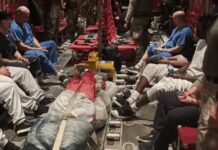US President Donald Trump has condemned the killing of dozens of civilians in northern Syria in an apparent chemical weapons attack by Syria’s air force.
It was an “affront to humanity”, he said, adding: “When you kill innocent children, innocent babies, little babies… that crosses… many lines.”
He did not mention Russia, Syria’s ally, which says chemical weapons in rebel hands may have been released.
But America’s envoy to the UN accused Russia of covering up for Damascus.
“Time and time again Russia uses the same false narrative to deflect attention from their ally in Damascus,” Nikki Haley said during a heated UN Security Council debate in New York.
Hinting at possible unilateral action by the US, she added: “When the United Nations consistently fails in its duty to act collectively, there are times in the life of states that we are compelled to take our own action.”
The government of Syrian President Bashar al-Assad denies its forces launched a chemical weapons attack.
What happened?
According to UK-based monitoring group the Syrian Observatory for Human Rights, 20 children and 52 adults were killed in the chemical incident in Khan Sheikhoun, Idlib province, on Tuesday.
Footage following the incident shows civilians, many of them children, choking and foaming at the mouth.
Both the World Health Organisation and medical charity MSF said some of the victims had symptoms consistent with exposure to nerve agents.
Witnesses say clinics treating the injured were then targeted by air strikes.
Will there be a change in US policy?
Mr Trump said: “I will tell you, it’s already happened, that my attitude towards Syria and Assad has changed very much… You’re now talking about a whole different level.”
Asked during a meeting with Jordan’s King Abdullah at the White House whether he was formulating a new policy towards Syria, Mr Trump told reporters, “You’ll see.”
Only last week, Ms Haley said the US was no longer prioritising the removal of President Assad, a shift in US policy from the Obama era.
Mr Trump has been promising a new strategy for Syria and Iraq and there have been some increases in troop numbers but this latest development will increase the pressure for more decisive action, the BBC’s Washington correspondent Gary O’Donoghue says.
What do the Russians say?
Russia has acknowledged that Syrian planes did attack Khan Sheikhoun but says the aircraft struck a depot producing chemical weapons, for use by militants in Iraq.
On Tuesday “Syrian aviation made a strike on a large terrorist ammunition depot and a concentration of military hardware in the eastern outskirts of Khan Sheikhoun town,” Russian defence ministry spokesman Igor Konoshenkov said.
“On the territory of the depot there were workshops which produced chemical warfare munitions.”
How does the Russian theory stack up?
A chemical weapons expert, Col Hamish de Bretton-Gordon, told the BBC the Russian version of events was “pretty fanciful”.
The idea that a nerve gas like Sarin could spread after a weapons manufacturing process had been bombed was “unsustainable”, he added.
Hasan Haj Ali, commander of the Free Idlib Army rebel group, told Reuters news agency: “Everyone saw the plane while it was bombing with gas.”
 Image copyrightGETTY IMAGES
Image copyrightGETTY IMAGES
Image captionWitnesses said clinics treating the wounded were subject to air strikes
Local journalists say there are no military positions in the town itself but an array of broadly aligned rebel groups controlling the area surrounding it.
Critics of the Russian statement say reports of the release of gas came hours before the times stated by Mr Konoshenkov.
Has Assad used chemical weapons before?
The Syrian government was accused by Western powers of firing rockets filled with Sarin at Ghouta, Damascus, killing hundreds of people in August 2013.
President Assad denied the charge, blaming rebel fighters, but he did subsequently agree to destroy Syria’s chemical arsenal.
Despite that, the Organisation for the Prohibition of Chemical Weapons has continued to document the use of toxic chemicals in attacks in Syria.
More than 250,000 people have been killed in Syria’s civil war and, after more than six years, no political solution to the fighting is in sight.
source: bbc






